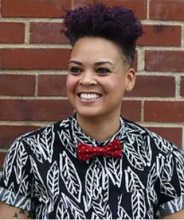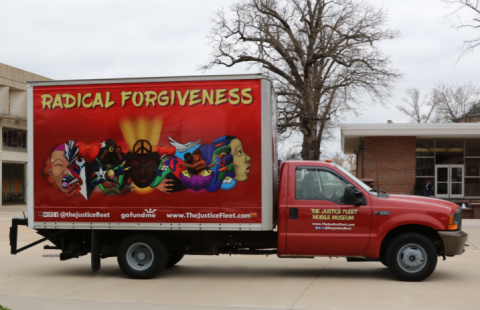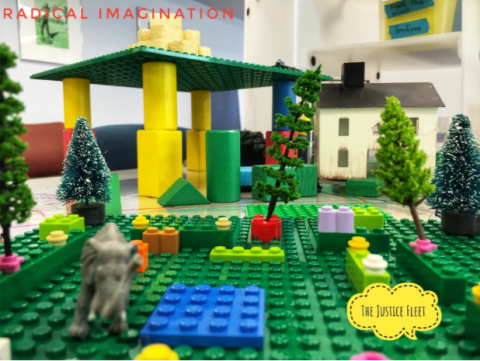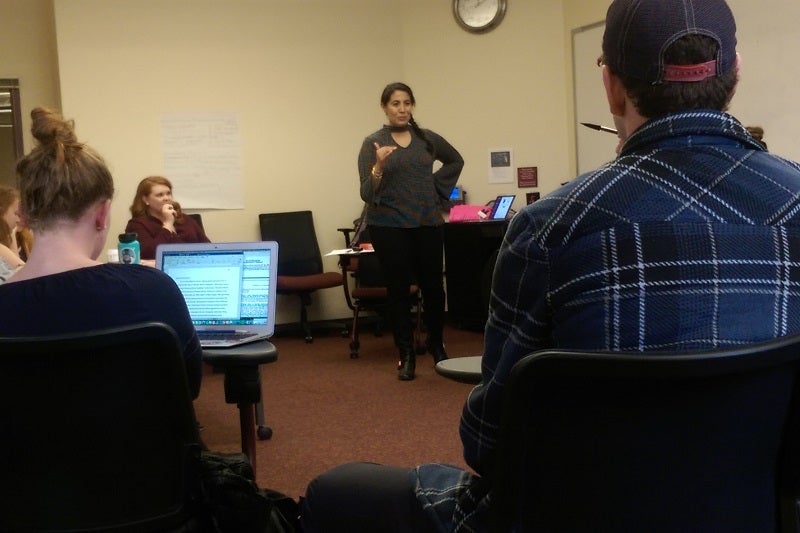Interactive Museum Brings Dialogue, Art, Play to Campus
The Justice Fleet arrives March 5
What if, to confront conflict, bias and prejudice, all it took was some time to play together? The University of Denver community will soon be able to answer that question, as an interactive mobile museum makes its way to campus for a week of art, activity and dialogue.
The Justice Fleet is an exhibit of sorts, touring the country with its creator, St. Louis University communications professor Amber Johnson. Its arrival at the Chambers Center Tuesday highlights three days of discussion and self-reflection, as students, staff, faculty and the community at large address implicit and explicit bias, social justice and empathy.
“I think undergraduate students are really hungry for a faculty response to some of the hurt that’s taken place on our campus,” says Christina Foust, the communication studies professor who is coordinating the visit. “Maybe by bringing the Justice Fleet we can have faculty as well as students come together and pause to think about how we can create a different campus … and promote some justice.”
Created in 2016, the Justice Fleet is a series of exhibits housed inside box trucks. The trucks can travel into neighborhoods to engage with the community. In addition to university campuses, the exhibits have stopped at libraries, museums and community centers.
In Denver, the displays will fill the Colorado Women’s College. DU has a full slate of programming to supplement the exhibit’s arrival. Faculty will use a panel discussion to reflect on the art of teaching toward justice, and Johnson will deliver a keynote address. Students from DU’s Identities in Dialogue course will display their group projects as well.
“Dialogue is, I think, so needed right now,” Foust says. “It really does position the University as an institution that could be seen as more valuable toward responding to the grand challenges that face us.”
After 14 years at DU, Foust says she wanted to create an event to give back to the campus she loves and celebrate the synergy of teaching, research and service.
The idea to incorporate the Justice Fleet, however, came from one of her students, Sarah Gonzalez Noveiri, a PhD candidate who worked with Johnson when earning her master’s degree at SLU.
“This is a great opportunity to expand your horizons,” says Noveiri, an international student from Lebanon. “I think it’s a great step toward changing things around here. I’m hoping that everyone will be able to take away good insight from the conversation and different ways of thinking about certain issues that are prominent in our society.”
To facilitate that conversation, the Justice Fleet’s exhibit will focus on a concept called “radical forgiveness”: a fluid and deliberate process that seeks to repair the wounds that impede people from bettering the world. Exhibit visitors will take part in an art-activism project called the Forgiveness Quilt, where they share their own biases and seek forgiveness.
The Justice Fleet will also offer 90-minute “radical imagination workshops,” encouraging participants to imagine a world where liberation and freedom from oppression are possible. Using craft items, art supplies and reclaimed goods, the group will literally build a model of the world they want to live in and discuss the ways to achieve it.
“Our goal is to leave behind a set of tools that people can implement in their interpersonal lives, in their relational lives, in the classroom as students, teachers, staff, whatever,” Johnson says. “I think universities are echo chambers of some of the same institutional and systemic injustices that we see in community life. So when people are harmed by their own universities, it's a place for people to debrief and process those things as well.”
That’s exactly the reason Foust says she appreciates the Justice Fleet’s methods. Traditional academic activities like lectures and readings don’t always foster connection.
Instead, it’s Johnson’s sort of cross-disciplinary activities, Foust says, that can act like wrecking balls to a university’s silos. And it’s the dialogue—not debate—they promote that builds a stronger community in their place.
“It will be worth everyone’s time to walk over, drop in and stop by [the exhibits],” Foust says. “I see it as connected to positioning the University of Denver as being more responsive to the needs of the community, the needs of the people around us.”












